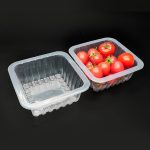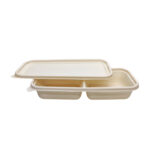Spain is adopting sustainable tableware through policies and consumer awareness. DASHAN provides eco-friendly options like corn starch, bagasse, and PLA tableware, reducing plastic waste and supporting green dining practices.
Introduction
In recent years, environmental sustainability has become a central concern for governments, businesses, and consumers worldwide. Spain is no exception. Growing awareness of plastic pollution, coupled with stringent regulations, has accelerated the adoption of eco-friendly alternatives to single-use plastic products. Among these alternatives, biodegradable and compostable tableware—such as corn starch, bagasse, and PLA (polylactic acid) utensils—has gained significant traction.
DASHAN, a global provider of sustainable tableware solutions, offers a variety of products tailored to meet these evolving needs. Their range includes corn starch cutlery, bagasse plates and bowls, and PLA cups, all designed to comply with international safety standards while reducing environmental impact.
This article explores Spain’s policies on disposable tableware, examines consumer attitudes toward biodegradable products, and highlights DASHAN’s eco-friendly solutions as a response to both regulatory requirements and market demand.
Spain’s National Policies on Biodegradable Tableware
1. The Spanish Plastic Tax
In 2023, Spain introduced a national plastic tax as part of Law 7/2022 on waste and contaminated land management. This legislation imposes a levy of €0.45 per kilogram on non-reusable plastic packaging, including disposable cutlery, cups, and food containers.
However, products made from biodegradable materials that meet EU standards—such as EN 13432 for compostable plastics—are exempt from this tax. This policy incentivizes businesses to adopt sustainable alternatives while penalizing single-use plastic, creating a financial and environmental rationale for switching to eco-friendly tableware.
2. Packaging Labeling Requirements (Royal Decree 1055/2022)
To increase transparency, Royal Decree 1055/2022 mandates that all packaging sold in Spain clearly indicates its disposal method. Terms like “eco-friendly” or “green” are prohibited unless substantiated, and packaging must include instructions for proper recycling or composting.
These labeling requirements aim to reduce confusion among consumers and ensure that biodegradable products are disposed of correctly, further supporting Spain’s environmental objectives.
3. Extended Producer Responsibility (EPR)
Spain also implements an Extended Producer Responsibility (EPR) system. Manufacturers are responsible for the entire lifecycle of their products, including post-consumer waste management. For tableware manufacturers, this means ensuring that disposable products can be collected, recycled, or composted effectively. EPR fosters innovation in sustainable materials and encourages companies to reduce environmental impacts.
Regional Initiatives in Spain
1. Navarra’s Sustainable Event Regulations (Foral Decree 36/2024)
Local authorities have also taken proactive measures. Navarra, for example, passed Foral Decree 36/2024, which prohibits the use of single-use plastic tableware, straws, and cutlery at public events starting in May 2025. All public events must now provide reusable or biodegradable alternatives, fostering a zero-waste culture at festivals, conferences, and municipal gatherings.
2. Other Regional Efforts
Several other autonomous communities, including Catalonia and Andalusia, have adopted similar regulations to reduce plastic waste in both the hospitality sector and public spaces. These initiatives often complement national legislation, creating a multi-layered regulatory environment that encourages the use of sustainable tableware throughout Spain.
Consumer Awareness and Market Trends
1. Increasing Demand for Sustainable Products
Spanish consumers are increasingly aware of the environmental impact of their daily choices. Surveys indicate a rising preference for biodegradable packaging and tableware, particularly among younger demographics. Cafes, restaurants, and event organizers are responding to this trend by switching from conventional plastic to compostable alternatives.
2. Preference for Certified Products
Consumers are paying closer attention to product certifications. Materials that meet EN 13432 standards or carry eco-labels are viewed as more reliable and safe. This consumer preference drives demand for suppliers who can provide compliant, sustainable tableware, such as DASHAN.
DASHAN’s Eco-Friendly Tableware Solutions in Spain
DASHAN provides a broad range of biodegradable and compostable tableware solutions that align with both regulatory requirements and consumer expectations. Key offerings include:
1. Corn Starch Tableware
-
Made from renewable corn starch
-
Biodegradable within 180 days in proper composting conditions
-
Suitable for hot and cold foods
-
Customizable with logos or prints for branding purposes
Applications: Cafes, schools, offices, outdoor events
2. Bagasse Tableware
-
Produced from sugarcane bagasse, a fibrous byproduct of sugar production
-
Sturdy and heat-resistant, ideal for hot meals
-
Biodegradable and compostable, minimizing landfill contributions
Applications: Restaurants, takeout services, catering, and fast-food chains
3. PLA (Polylactic Acid) Tableware
-
Derived from renewable plant-based resources
-
High transparency and suitable for cold beverages
-
Fully compostable under industrial conditions
Applications: Cold drinks, smoothies, juices, and desserts
By offering these products, DASHAN not only provides practical solutions for businesses but also helps them comply with Spain’s environmental policies and meet growing consumer demand for sustainable options.
Challenges and Opportunities
1. Challenges
-
Cost: Biodegradable tableware often comes at a higher price than conventional plastic.
-
Infrastructure: Proper composting facilities are still limited in some regions.
-
Consumer Education: Users must understand how to dispose of biodegradable products correctly.
2. Opportunities
-
Brand Differentiation: Businesses adopting eco-friendly tableware can enhance their reputation.
-
Market Expansion: Growing environmental awareness opens opportunities for suppliers like DASHAN.
-
Policy Alignment: Compliance with Spanish and EU regulations can reduce tax burdens and enhance operational sustainability.
Conclusion
Spain’s regulatory landscape for single-use tableware is evolving rapidly. National laws, regional initiatives, and growing consumer awareness are driving a shift toward sustainable alternatives. DASHAN’s range of corn starch, bagasse, and PLA products provides practical, compliant, and eco-friendly solutions for this changing market. By adopting these biodegradable tableware products, businesses in Spain can reduce environmental impacts, align with government policies, and meet the expectations of increasingly eco-conscious consumers.
FAQ
-
What are the main sustainable tableware materials available in Spain?
Spain offers biodegradable and compostable tableware made from materials like corn starch, sugarcane bagasse, and PLA, which reduce environmental impact compared to traditional plastic products. -
How is Spain promoting the use of sustainable tableware?
The Spanish government has implemented policies to limit single-use plastics, encourage eco-friendly alternatives, and support businesses that adopt biodegradable and compostable products. -
What role does consumer awareness play in sustainable tableware adoption in Spain?
Increasing public awareness about environmental sustainability drives demand for eco-friendly tableware, encouraging restaurants, cafes, and households to choose biodegradable options. -
How does DASHAN contribute to eco-friendly dining in Spain?
DASHAN provides a variety of sustainable tableware solutions, including corn starch cups, bagasse plates, and PLA products, helping businesses meet regulatory requirements and satisfy environmentally conscious consumers. -
Are DASHAN’s biodegradable tableware products suitable for hot and cold foods?
Yes, DASHAN’s products are designed for versatility, safely handling both hot and cold foods while remaining durable, leak-resistant, and fully compostable.
Reference Source List
-
Plastics for Change – Understanding Spain’s Plastic Tax
-
Packnode – Spain’s Packaging Labeling Requirements
-
Ecoembes – Extended Producer Responsibility
-
Encore Solution – Sustainability Regulations for Large Events in Spain
-
European Bioplastics – EN 13432 Standard Overview
-
DASHAN Official Product Page – Biodegradable Tableware Solutions




